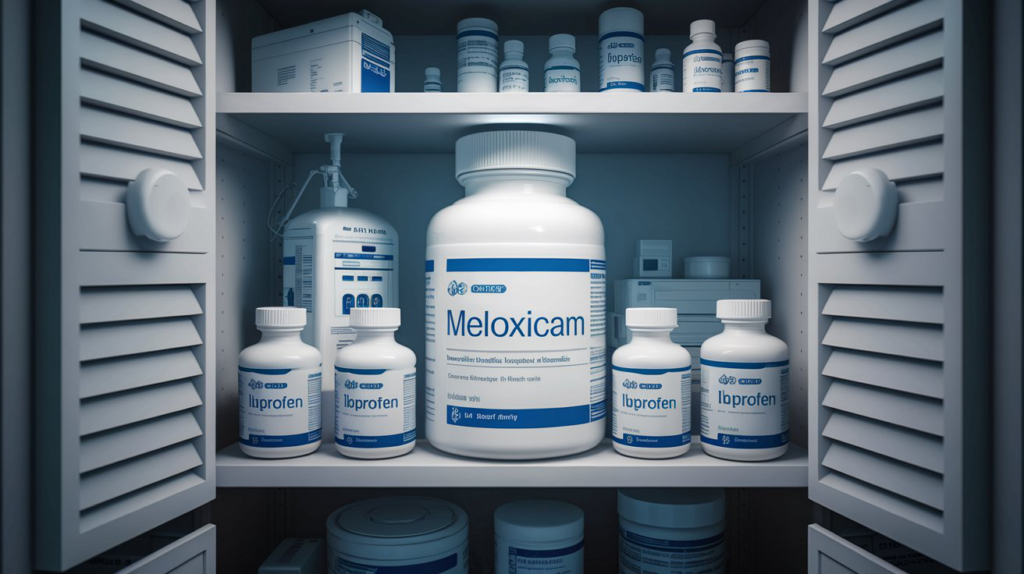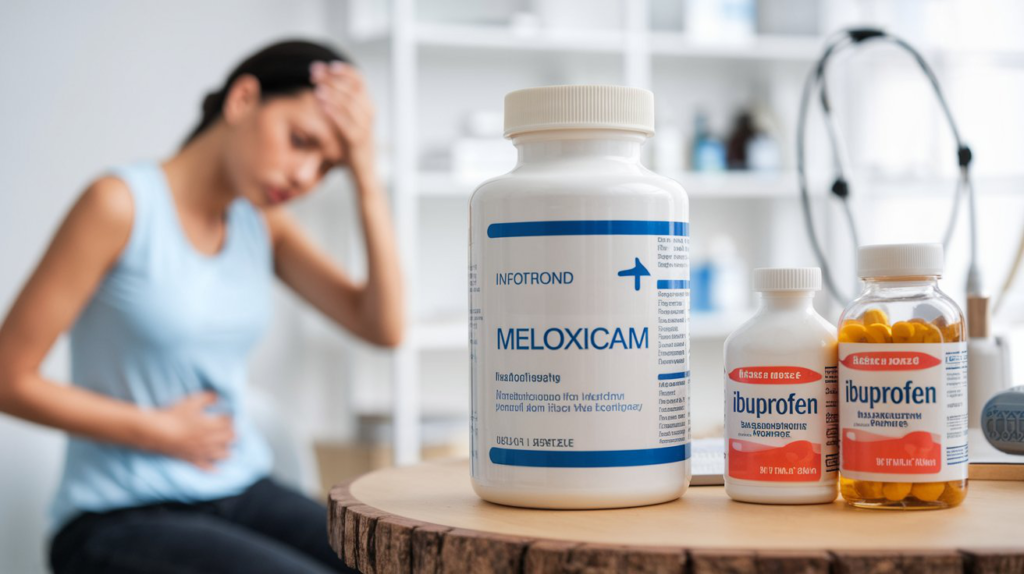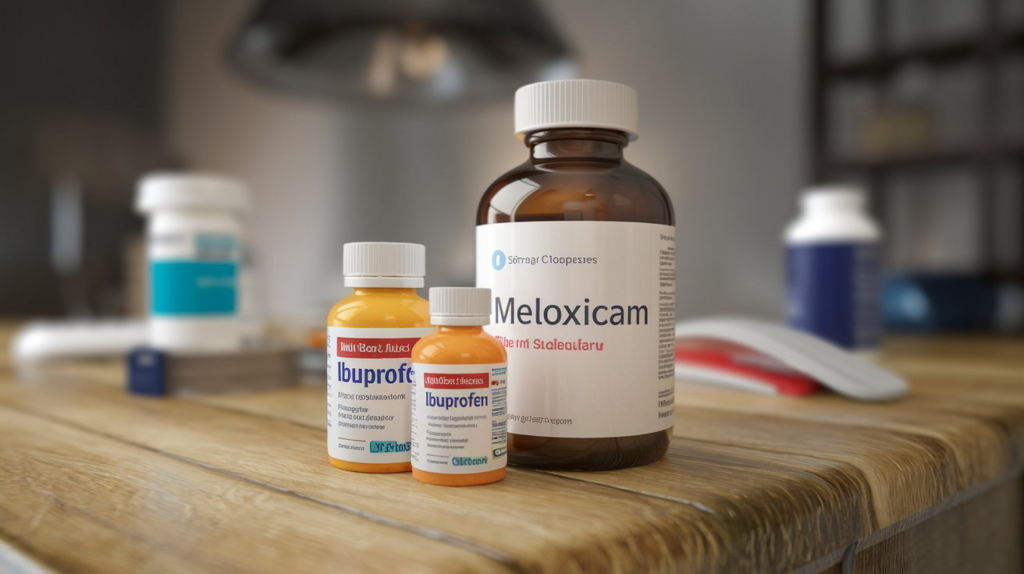Last updated on December 17th, 2024 at 01:04 pm
- 1. Understanding Meloxicam and Ibuprofen
- 1.1 Meloxicam: An Overview
- 1.2 Ibuprofen: A Common Pain Reliever
- 2. The Risks of Combining Meloxicam and Ibuprofen
- 2.1 Increased Risk of Side Effects
- 2.2 Kidney Complications
- 2.3 Blood Pressure Concerns
- 3. Pharmacological Interactions
- 3.1 Mechanism of Action Overlap
- 3.2 Drug Metabolism and Elimination
- 4. Alternative Pain Management Strategies
- 4.1 Non-Pharmacological Approaches
- 4.2 Safer Medication Combinations
- 5. The Importance of Professional Medical Advice
- 5.1 Consulting Healthcare Providers
- 5.2 Regular Medication Reviews
- 6. Understanding Drug Interactions Beyond NSAIDs
- 6.1 Common Drug Interactions with NSAIDs
- 6.2 The Role of Pharmacogenomics
- 7. Long-Term Considerations in Pain Management
- 7.1 Chronic Use of NSAIDs
- 7.2 Developing a Comprehensive Pain Management Plan
- 8. The Future of Pain Management
- 8.1 Emerging Therapies
- 8.2 Personalized Medicine in Pain Management
- NSAID Alternatives for Arthritis-Related Pain
- Understanding the Drug Safety Profile of Meloxicam and Ibuprofen
- Potential Adverse Effects on Cardiovascular Health
- Impact on Gastrointestinal Health
- Effects on Kidney Function
- Liver Toxicity Concerns
- Meloxicam and Ibuprofen for Rheumatoid Arthritis
- Cardiovascular Complications from Prostaglandin Inhibition
- Drug Interaction and Safety Considerations
- Renal Impairment and Adverse Reactions
- Risk of Fluid Retention and Cardiovascular Issues
- Safer Pain Management for Chronic Conditions
- Meloxicam Ibuprofen Combined Therapy for Joint Pain
- Consulting a Healthcare Provider for Personalized Care
- The Role of Observational Studies in Drug Safety
- Medication Alternatives for Autoimmune Disorders
- Addressing Pre-Existing Heart Conditions
- The Role of Diet and Supplements in Inflammation Reduction
- Additional Considerations for Meloxicam Ibuprofen Use
- Chest Pain and Shortness of Breath
- Impact on Stomach Lining and Digestive Issues
- Blood Flow and Platelet Function
- Risk of Hearing Issues and Blurred Vision
- Risk of Liver and Kidney Damage
- Meloxicam Ibuprofen Over-The-Counter vs Prescription Drug Use
- Cardiovascular Issues and Fluid Retention
- Use of Meloxicam Ibuprofen in Juvenile Rheumatoid Arthritis
- Risk of Myocardial Infarction and Cardiovascular Complications
- Confidential Helpline for Pain Management Guidance
- Ginkgo Biloba and Meloxicam Ibuprofen Interactions
- Ankylosing Spondylitis Treatment and Meloxicam Ibuprofen Gap
- Frequently Asked Questions
- Can You Take Meloxicam And Ibuprofen At The Same Time?
- What Are The Potential Side Effects Of Combining Meloxicam And Ibuprofen?
- How Does Meloxicam Affect Platelet Function Compared To Ibuprofen?
- Are There Risks Of Kidney Damage When Taking Meloxicam And Ibuprofen Together?
- Can Combining Meloxicam And Ibuprofen Increase The Risk Of Heart Attack?
- What Are The Gastrointestinal Risks Of Meloxicam And Ibuprofen Combination?
- Can Meloxicam And Ibuprofen Be Taken For Arthritis Pain Simultaneously?
- Is It Safe To Take Meloxicam With Ibuprofen For Acute Pain Relief?
- What Should I Do If I Experience Chest Pain After Taking Meloxicam And Ibuprofen Together?
- Can Meloxicam And Ibuprofen Combination Cause Liver Damage?
- Is There A Risk Of Stomach Ulcers With Meloxicam And Ibuprofen Together?
- How Does The Combination Of Meloxicam And Ibuprofen Affect Blood Pressure?
- Are There Any Safer Alternatives To Meloxicam And Ibuprofen For Pain Relief?
- Can Taking Meloxicam And Ibuprofen Together Lead To Fluid Retention?
- What Should Be The Gap Between Meloxicam And Ibuprofen Intake?
- Are There Any Observational Studies On Meloxicam And Ibuprofen Combination Use?
- What Are The Cardiovascular Risks Associated With Meloxicam And Ibuprofen?
- How Does Combining Meloxicam And Ibuprofen Impact The Gastrointestinal Tract?
- What Is The Effect Of Meloxicam And Ibuprofen On Renal Impairment?
- Are There Any Drug Interaction Risks Between Meloxicam And Ibuprofen?
Living with chronic pain or inflammation often leads individuals to explore various medication options for relief. Two commonly prescribed drugs, meloxicam and ibuprofen, are frequently used to manage these conditions.
Considering mixing Meloxicam & Ibuprofen? Is it safe to mix Meloxicam and Ibuprofen? Learn about the potential risks, side effects, and safer alternatives for pain management. Read before combining these NSAIDs.
1. Understanding Meloxicam and Ibuprofen
1.1 Meloxicam: An Overview
Meloxicam belongs to a class of drugs known as nonsteroidal anti-inflammatory drugs (NSAIDs). It is primarily used to treat osteoarthritis, rheumatoid arthritis, and other inflammatory conditions. Meloxicam works by reducing the production of prostaglandins, which are responsible for pain and inflammation in the body.
1.2 Ibuprofen: A Common Pain Reliever
Ibuprofen, also an NSAID, is widely available over-the-counter and used to treat various types of pain, including headaches, menstrual cramps, and minor injuries. Like meloxicam, it inhibits prostaglandin production, thereby reducing pain and inflammation.
2. The Risks of Combining Meloxicam and Ibuprofen
2.1 Increased Risk of Side Effects
Taking meloxicam and ibuprofen together can significantly increase the risk of adverse effects associated with NSAIDs. These may include gastrointestinal issues, such as stomach ulcers, bleeding, and perforation. The combination can also elevate the risk of cardiovascular problems, including heart attacks and strokes.
2.2 Kidney Complications
Both medications can affect kidney function when used individually. Combining them may exacerbate this effect, potentially leading to acute kidney injury or worsening existing kidney problems, especially in individuals with compromised renal function.


2.3 Blood Pressure Concerns
NSAIDs are known to increase blood pressure in some individuals. Using meloxicam and ibuprofen simultaneously may compound this effect, potentially leading to hypertension or worsening existing high blood pressure.
3. Pharmacological Interactions
3.1 Mechanism of Action Overlap
Both meloxicam and ibuprofen work by inhibiting cyclooxygenase (COX) enzymes, which are responsible for prostaglandin production. Using them together doesn’t provide additional benefits but increases the risk of side effects due to their similar mechanisms of action.
3.2 Drug Metabolism and Elimination
The liver metabolizes both medications, and the kidneys eliminate them. Combining these drugs can overwhelm these organs, potentially leading to decreased drug clearance and increased plasma concentrations, which may result in toxicity.
4. Alternative Pain Management Strategies
4.1 Non-Pharmacological Approaches
Instead of combining medications, consider exploring non-drug treatments for pain management. These may include physical therapy, acupuncture, massage therapy, and mindfulness techniques such as meditation or yoga. These approaches can be effective in managing chronic pain without the risks associated with medication interactions.


4.2 Safer Medication Combinations
If additional pain relief is necessary, consult a healthcare provider about safer alternatives. For instance, combining an NSAID with acetaminophen (Tylenol) can provide effective pain relief without the risks associated with using two NSAIDs together.
5. The Importance of Professional Medical Advice
5.1 Consulting Healthcare Providers
Before combining any medications or making changes to a treatment regimen, it’s crucial to consult with a healthcare provider. They can assess individual risk factors, medical history, and current medications to provide personalized advice on the safest and most effective pain management strategy.
5.2 Regular Medication Reviews
For individuals managing chronic pain, regular medication reviews with a healthcare provider are essential. These reviews can help identify potential drug interactions, assess the ongoing need for certain medications, and explore new treatment options as they become available.
6. Understanding Drug Interactions Beyond NSAIDs
6.1 Common Drug Interactions with NSAIDs
NSAIDs like meloxicam and ibuprofen can interact with various other medications, including blood thinners, certain antidepressants, and some blood pressure medications. Understanding these interactions is crucial for safe medication use and effective pain management.


6.2 The Role of Pharmacogenomics
Emerging research in pharmacogenomics suggests that genetic factors can influence how individuals respond to NSAIDs and other medications. This field of study may lead to more personalized approaches to pain management in the future, potentially reducing the risk of adverse drug interactions.
7. Long-Term Considerations in Pain Management
7.1 Chronic Use of NSAIDs
Long-term use of NSAIDs, whether meloxicam, ibuprofen, or a combination, can lead to various health issues. These may include an increased risk of cardiovascular events, gastrointestinal complications, and kidney problems. It’s essential to regularly reassess the need for these medications and explore alternative pain management strategies.
7.2 Developing a Comprehensive Pain Management Plan
Effective long-term pain management often requires a multifaceted approach. This may involve a combination of medications, physical therapy, lifestyle modifications, and psychological support. Developing a comprehensive plan with healthcare providers can lead to better pain control and improved quality of life.
8. The Future of Pain Management
8.1 Emerging Therapies
Research into new pain management therapies is ongoing. Promising areas include targeted drug delivery systems, novel anti-inflammatory compounds, and regenerative medicine approaches. These advancements may provide alternatives to traditional NSAIDs, potentially reducing the need for combination therapies.
8.2 Personalized Medicine in Pain Management
The field of personalized medicine is rapidly evolving, with implications for pain management. Future approaches may involve tailoring pain treatments based on an individual’s genetic profile, lifestyle factors, and specific pain conditions, leading to more effective and safer pain relief strategies.
NSAID Alternatives for Arthritis-Related Pain
For those considering options beyond mixing meloxicam and ibuprofen, alternative treatments can offer enhanced pain relief.
Omega-3 fatty acids have shown potential benefits for individuals with arthritis-related pain. They support inflammation reduction without the associated cardiovascular complications linked to NSAIDs.
Understanding the Drug Safety Profile of Meloxicam and Ibuprofen
The combination of meloxicam ibuprofen usage necessitates close monitoring due to the increased risk of severe side effects.
Both drugs, as non-steroidal anti-inflammatory drugs, can lead to gastrointestinal ulcers and kidney damage. It is crucial for patients to consult a healthcare professional before any meloxicam ibuprofen concurrent use.


Potential Adverse Effects on Cardiovascular Health
Combining meloxicam and ibuprofen elevates cardiovascular risks. These risks include a heightened risk of heart attack.
Patients with pre-existing heart conditions or cardiovascular risk factors should exercise extreme caution with meloxicam ibuprofen dual therapy. Both drugs can impair platelet aggregation, increasing the risk of blood clots and other cardiovascular issues.
Impact on Gastrointestinal Health
Meloxicam ibuprofen gastrointestinal side effects are significant concerns with their simultaneous intake. Gastrointestinal bleeding is a major risk when these medications are used together.
The risk of stomach ulcers and gastric bleeding further emphasizes the importance of consulting a medical professional. A suitable pain management plan can prevent these serious complications.
Effects on Kidney Function
The use of meloxicam ibuprofen together may result in adverse effects on renal function. The increased risk of kidney damage is especially concerning in patients with impaired kidney function.
It is essential to avoid excessive fluid retention, as it may worsen kidney issues. Fluid retention can even lead to kidney failure in vulnerable individuals.
Liver Toxicity Concerns
Meloxicam ibuprofen liver toxicity is another serious concern. Both drugs can burden the liver, leading to potential liver damage.
This is especially true with prolonged or high-dose usage. Regular monitoring of liver enzymes can help detect early signs of liver toxicity and prevent further complications.
Meloxicam and Ibuprofen for Rheumatoid Arthritis
For patients with rheumatoid arthritis, combining nonsteroidal anti-inflammatory drugs might seem beneficial. However, meloxicam ibuprofen contraindications make this combination risky.
Adverse reactions, such as stomach pain and liver damage, are common. Instead, patients should follow a healthcare provider’s prescription medication guidelines to avoid these severe side effects.
Cardiovascular Complications from Prostaglandin Inhibition
Meloxicam and ibuprofen both inhibit the production of prostaglandins through the COX-2 enzyme pathway. This inhibition leads to reduced inflammation.
However, it also compromises the protective lining of the stomach. Long-term use may contribute to cardiovascular complications, such as Myocardial infarction and Heart Failure.


Drug Interaction and Safety Considerations
Meloxicam ibuprofen drug interactions can lead to severe gastrointestinal tract complications. These complications include gastrointestinal ulcers and gastric ulcers.
Patients taking meloxicam ibuprofen for moderate pain or severe pain need to be cautious. Both drugs belong to the same drug class, increasing the likelihood of overlapping side effects.
Renal Impairment and Adverse Reactions
Patients with a history of renal impairment should avoid the meloxicam ibuprofen combination. NSAIDs like meloxicam and ibuprofen can impact blood flow to the kidneys.
This can worsen kidney issues and increase the risk of kidney failure. Patients on loop diuretics or thiazide diuretics should also consult a healthcare professional to prevent potential kidney complications.
Risk of Fluid Retention and Cardiovascular Issues
Meloxicam ibuprofen overlap can cause water retention. Water retention may further exacerbate cardiovascular issues.
Fluid retention can elevate blood pressure. This increases the risk of hypertension treatment intensification and makes simultaneous intake risky for patients with heart disease.
Safer Pain Management for Chronic Conditions
For individuals with chronic conditions, safer alternatives to meloxicam ibuprofen combined therapy exist. Acetaminophen can be an effective option for mild pain.
When used in accordance with a medical professional’s recommendations, acetaminophen avoids the risks associated with NSAIDs. These include gastrointestinal bleeding and cardiovascular complications.
Meloxicam Ibuprofen Combined Therapy for Joint Pain
Using meloxicam ibuprofen for joint pain may seem advantageous. However, the risks of gastrointestinal side effects outweigh the potential benefits.
Side effects like blood in stools or dark blood due to gastrointestinal bleeding are common. Alternative therapies such as behavioral factors management and physical therapy provide safer options for arthritis-related joint inflammation.
Consulting a Healthcare Provider for Personalized Care
Before embarking on meloxicam ibuprofen joint use, it is imperative to use a drug interaction checker. This tool helps patients understand the risks involved.
Healthcare providers can assess the current health condition. They can recommend an effective dose or alternative treatment options to reduce severe adverse reactions.


The Role of Observational Studies in Drug Safety
Observational studies have outlined the risks involved in meloxicam ibuprofen co-administration. Clinical studies confirm increased risks like platelet dysfunction.
Patients must prioritize safety. They should rely on prescription nonsteroidal anti-inflammatory drug alternatives approved by healthcare providers.
Medication Alternatives for Autoimmune Disorders
For autoimmune disorders like ankylosing spondylitis, meloxicam ibuprofen alternative options may be safer. Anti-rheumatic drugs are preferred.
These drugs avoid gastrointestinal ulcers and liver damage. Patients should discuss these alternatives with their healthcare provider.
Addressing Pre-Existing Heart Conditions
Patients with pre-existing heart conditions are at a higher risk when considering meloxicam ibuprofen cardiovascular risks. The combination can exacerbate cardiovascular issues.
These issues can lead to heart attacks or strokes. Consulting a healthcare professional is crucial for managing pain without increasing cardiovascular risks.
The Role of Diet and Supplements in Inflammation Reduction
Inflammation reduction can also be achieved through dietary changes. Omega-3 fatty acids are particularly effective.
Lifestyle adjustments can further support inflammation reduction. These changes can help reduce the risks associated with meloxicam ibuprofen drug interactions.
Additional Considerations for Meloxicam Ibuprofen Use
Chest Pain and Shortness of Breath
Combining meloxicam and ibuprofen can elevate the risk of cardiovascular complications. Chest pain and Shortness of breath are serious symptoms.
Patients should seek medical attention immediately if these symptoms arise. Prompt action can help mitigate severe cardiovascular outcomes.
Impact on Stomach Lining and Digestive Issues
Both drugs compromise the stomach lining, potentially leading to stomach issues. These include abdominal pain, stomach upset, and gastric ulcers.
Individuals should avoid meloxicam ibuprofen overlap unless deemed necessary by a healthcare professional. Consulting a healthcare provider can mitigate the risk of gastrointestinal side effects.
Blood Flow and Platelet Function
Meloxicam ibuprofen can significantly affect blood flow. It can impair normal platelet function.
This impairment increases the risk of platelet dysfunction and blood clots. Such complications can hinder the ability of blood to clot properly, leading to increased bleeding.
Risk of Hearing Issues and Blurred Vision
Blurred vision and hearing issues are common side effects when using meloxicam ibuprofen together. Patients should exercise caution.
They should avoid driving or operating machinery if these symptoms persist. Consulting a medical professional is essential if these side effects are prolonged.
Risk of Liver and Kidney Damage
Patients using a higher dose of meloxicam or prolonged meloxicam ibuprofen combination are at risk. Significant liver damage and kidney issues are possible.
Regular liver and renal function tests can detect these potential side effects early. Monitoring is essential for managing adverse reactions effectively.
Meloxicam Ibuprofen Over-The-Counter vs Prescription Drug Use
Ibuprofen is available over-the-counter, whereas meloxicam is a prescription drug. Patients should not take these drugs together without consulting a healthcare provider.
Consultation is particularly important for managing moderate or acute pain. This ensures an appropriate dose of meloxicam or prescription ibuprofen is used safely.


Cardiovascular Issues and Fluid Retention
Meloxicam ibuprofen cardiovascular risks include the potential for Heart Failure due to fluid retention. Patients with cardiovascular conditions must be especially cautious.
Water pills or angiotensin receptor blockers should only be used under guidance. Consulting healthcare providers is vital for avoiding adverse cardiovascular effects.
Use of Meloxicam Ibuprofen in Juvenile Rheumatoid Arthritis
Using meloxicam ibuprofen combined therapy in younger patients can lead to severe side effects. Gastrointestinal bleeding and Kidney failure are significant risks.
Safer alternatives exist for juvenile rheumatoid arthritis. Antiinflammatory drugs approved for younger populations should be prioritized to minimize risks.
Risk of Myocardial Infarction and Cardiovascular Complications
Meloxicam ibuprofen compatibility carries an increased risk of cardiovascular issues. This includes Myocardial infarction.
Patients should seek medical advice to understand their risk factors. Informed decisions about pain management can help minimize cardiovascular risks.
Confidential Helpline for Pain Management Guidance
Patients unsure about meloxicam ibuprofen contraindications can reach out to a confidential helpline. Governmental agencies or private insurances often offer these services.
These resources provide professional medical advice on drug safety. Utilizing such services can prevent severe adverse effects associated with improper medication use.
Ginkgo Biloba and Meloxicam Ibuprofen Interactions
Patients using supplements like ginkgo biloba should exercise caution. Combining ginkgo biloba with meloxicam ibuprofen may lead to adverse reactions.
Consulting a healthcare professional ensures safe use. They can determine whether these supplements can be safely combined with NSAIDs.
Ankylosing Spondylitis Treatment and Meloxicam Ibuprofen Gap
In ankylosing spondylitis treatment, maintaining a meloxicam ibuprofen interval is advisable. This helps avoid gastrointestinal side effects.
The lowest dose of meloxicam should be used to achieve effective inflammation reduction. Consulting a healthcare professional can help determine the appropriate dosing.
From Embrace Inner Chaos to your inbox
Transform your Chaos into authentic personal growth – sign up for our free weekly newsletter! Stay informed on the latest research advancements covering:
Narcissistic Personality Disorder (NPD)
Frequently Asked Questions
Can You Take Meloxicam And Ibuprofen At The Same Time?
Taking meloxicam and ibuprofen together is generally not recommended. This is due to the risk of severe gastrointestinal side effects.
Both drugs belong to the class of non-steroidal anti-inflammatory drugs (NSAIDs). They can increase the risk of gastrointestinal bleeding and gastric ulcers when combined.
A healthcare professional should be consulted before considering the simultaneous use of these medications. Combining them may result in enhanced risk of renal impairment and cardiovascular issues.
Visit Mayo Clinic for specific guidelines.


What Are The Potential Side Effects Of Combining Meloxicam And Ibuprofen?
Combining meloxicam and ibuprofen can lead to adverse effects such as gastrointestinal bleeding and kidney damage. It also increases the risk of heart attack or stroke.
Both medications inhibit the production of prostaglandins, which protect the stomach lining. They also regulate blood flow to the kidneys, leading to a higher chance of gastrointestinal issues and renal impairment.
If taken together, the risk of these adverse effects is significantly heightened. This makes it crucial to seek medical advice.
Detailed effects are described at WebMD.
How Does Meloxicam Affect Platelet Function Compared To Ibuprofen?
Meloxicam has a less pronounced effect on platelet function compared to ibuprofen. This is because it is more selective in inhibiting the COX-2 enzyme, which plays a smaller role in platelet aggregation.
Ibuprofen, on the other hand, inhibits both COX-1 and COX-2. This leads to reduced platelet aggregation and impaired normal clotting ability.
This difference makes meloxicam potentially less risky for those concerned about blood clotting issues. Additional details can be found at Cleveland Clinic.
Are There Risks Of Kidney Damage When Taking Meloxicam And Ibuprofen Together?
The concurrent use of meloxicam and ibuprofen significantly increases the risk of kidney damage. Both drugs impact renal function by reducing prostaglandin synthesis, which helps maintain blood flow to the kidneys.
Combining these NSAIDs can lead to reduced kidney filtration and potentially acute kidney failure. This risk is especially high in individuals with pre-existing kidney conditions.
It is important to consult a healthcare provider for safe alternatives. More information is available at National Kidney Foundation.


Can Combining Meloxicam And Ibuprofen Increase The Risk Of Heart Attack?
Yes, combining meloxicam and ibuprofen can elevate the risk of cardiovascular complications. These complications include heart attack.
Both medications can contribute to the narrowing of blood vessels and promote fluid retention. This increases blood pressure and places added strain on the heart.
This risk is especially significant in patients with pre-existing heart conditions or cardiovascular risk factors. Specific risks are outlined by the American Heart Association.
What Are The Gastrointestinal Risks Of Meloxicam And Ibuprofen Combination?
Meloxicam and ibuprofen both carry risks of gastrointestinal side effects. These include stomach ulcers and gastrointestinal bleeding.
When taken together, these risks are compounded due to the dual inhibition of protective prostaglandins. These prostaglandins are essential for maintaining the stomach lining.
The increased risk of gastric bleeding and ulcers necessitates careful medical supervision. This is especially important if both medications are being considered.
Details on gastrointestinal risks are provided by Johns Hopkins Medicine.
Can Meloxicam And Ibuprofen Be Taken For Arthritis Pain Simultaneously?
Meloxicam and ibuprofen are both prescribed for arthritis pain. However, they should not be taken together due to their similar mechanism of action.
This similarity can lead to increased side effects. Each drug inhibits the COX enzymes involved in inflammation.
Taking them concurrently does not provide additional pain relief. Instead, it increases the risk of gastrointestinal and renal complications.
For arthritis management, consult your doctor to explore safer alternatives. Consult the Arthritis Foundation for alternative pain options.
Is It Safe To Take Meloxicam With Ibuprofen For Acute Pain Relief?
Taking meloxicam with ibuprofen for acute pain relief is unsafe. This is due to their combined adverse effects.
The overlap in their pharmacological action leads to a higher likelihood of side effects. These include gastrointestinal bleeding and kidney issues.
It is advisable to use only one NSAID at a time to avoid these risks. Consult a healthcare professional for an effective pain management plan.
More information can be found at Harvard Health.


What Should I Do If I Experience Chest Pain After Taking Meloxicam And Ibuprofen Together?
If you experience chest pain after taking meloxicam and ibuprofen together, seek immediate medical attention. Chest pain can be a sign of a serious cardiovascular event.
Such an event could include a heart attack. This can be exacerbated by the combined cardiovascular risks of these drugs.
Prompt intervention is critical in such cases to prevent severe outcomes. Refer to the American College of Cardiology for further specifics.
Can Meloxicam And Ibuprofen Combination Cause Liver Damage?
The combination of meloxicam and ibuprofen can increase the risk of liver damage. This is especially true in individuals with pre-existing liver conditions or those consuming alcohol.
Both NSAIDs are metabolized by the liver. Concurrent use can lead to elevated liver enzymes, indicating stress on the liver.
It is important to monitor liver function and avoid combining these drugs without medical supervision. Details on liver health are provided by the Liver Foundation.
Is There A Risk Of Stomach Ulcers With Meloxicam And Ibuprofen Together?
Yes, there is a heightened risk of developing stomach ulcers when meloxicam and ibuprofen are taken together. Both drugs reduce the production of protective prostaglandins in the stomach.
This reduction leads to an increased risk of gastrointestinal ulcers and bleeding. To minimize these risks, a healthcare provider may suggest alternative pain management strategies.
Information is available at the National Institute of Diabetes and Digestive and Kidney Diseases.
How Does The Combination Of Meloxicam And Ibuprofen Affect Blood Pressure?
The combination of meloxicam and ibuprofen can contribute to increased blood pressure. This is due to their effect on fluid retention and reduced blood vessel dilation.
This combined effect places extra strain on the cardiovascular system. It may lead to complications, especially in individuals with hypertension.
Consulting a healthcare provider is essential for those managing high blood pressure. Visit Blood Pressure UK for more on blood pressure management.


Are There Any Safer Alternatives To Meloxicam And Ibuprofen For Pain Relief?
There are safer alternatives to taking meloxicam and ibuprofen together for pain relief. Options like acetaminophen may be considered for mild to moderate pain.
These alternatives do not carry the same gastrointestinal and renal risks associated with NSAIDs. In cases of severe pain, a healthcare provider might recommend other classes of medications or a tailored approach to minimize side effects.
Pain relief alternatives are described by the National Health Service.
Can Taking Meloxicam And Ibuprofen Together Lead To Fluid Retention?
Yes, taking meloxicam and ibuprofen together can lead to fluid retention. This is due to their effect on renal function.
Both drugs can cause the kidneys to retain sodium and water. This may lead to swelling, increased blood pressure, and worsening of heart failure symptoms in susceptible individuals.
It is critical to consult a healthcare professional if symptoms of fluid retention occur. Consult the Cleveland Clinic for more specific information.
What Should Be The Gap Between Meloxicam And Ibuprofen Intake?
A sufficient gap between meloxicam and ibuprofen intake is crucial to prevent adverse effects. Generally, it is advisable to avoid taking both drugs on the same day.
Allowing at least 24 hours between doses can minimize the risk of cumulative gastrointestinal and renal side effects. Consulting with a healthcare provider can help determine an appropriate dosing schedule for your specific condition.
Detailed guidelines are available at Drugs.com.
Are There Any Observational Studies On Meloxicam And Ibuprofen Combination Use?
Observational studies have shown that the combination of meloxicam and ibuprofen can increase the risk of adverse outcomes. These outcomes include gastrointestinal bleeding, cardiovascular events, and impaired kidney function.
These studies suggest that using both NSAIDs concurrently offers no additional pain relief. Instead, it substantially raises health risks.
Always seek professional medical advice before combining medications. Access observational studies at the National Center for Biotechnology Information.


What Are The Cardiovascular Risks Associated With Meloxicam And Ibuprofen?
The cardiovascular risks associated with combining meloxicam and ibuprofen include an increased likelihood of high blood pressure and fluid retention. Potentially severe events like heart attack or stroke may also occur.
Both medications can lead to reduced blood flow and increase the strain on the cardiovascular system. This is especially true in individuals with underlying heart conditions.
It is important to consider safer alternatives if cardiovascular risks are a concern. Specific cardiovascular risks are listed by the American Heart Association.
How Does Combining Meloxicam And Ibuprofen Impact The Gastrointestinal Tract?
Combining meloxicam and ibuprofen can have severe impacts on the gastrointestinal tract. These impacts include increased risks of ulcers, bleeding, and irritation.
Both drugs inhibit COX enzymes involved in maintaining the protective lining of the stomach. This inhibition can lead to gastric damage when taken concurrently.
Individuals with a history of gastrointestinal issues should avoid combining these drugs. Gastrointestinal impacts are discussed by the Cleveland Clinic.
What Is The Effect Of Meloxicam And Ibuprofen On Renal Impairment?
The effect of taking meloxicam and ibuprofen together on renal function can be particularly harmful. Both medications reduce prostaglandin production, which helps maintain adequate blood flow to the kidneys.
The combined use can lead to reduced kidney filtration and fluid retention. It may even cause acute kidney failure in those with pre-existing renal conditions.
It is crucial to monitor kidney health when using NSAIDs. Details on renal health are provided by the National Kidney Foundation.
Are There Any Drug Interaction Risks Between Meloxicam And Ibuprofen?
The drug interaction risks between meloxicam and ibuprofen are significant. Both belong to the NSAID class and have overlapping effects.
Their concurrent use increases the likelihood of severe side effects, such as gastrointestinal bleeding, renal impairment, and cardiovascular complications. It is advisable to use a drug interaction checker or consult with a healthcare provider to ensure drug safety.
Consult the Food and Drug Administration for drug interaction specifics.




